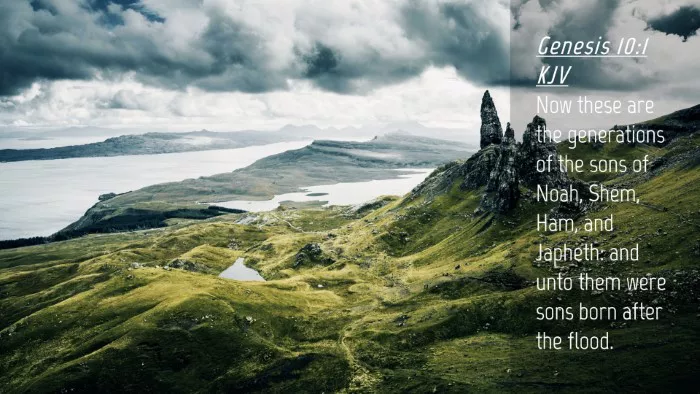Read the Daily Bible Verse Genesis 10:1 To Strengthen Your Spiritual Journey.
Genesis 10:1 KJV
“Now these are the generations of the sons of Noah, Shem, Ham, and Japheth: and unto them were sons born after the flood.”
Genesis 10:1 KJV Background
Genesis 10:1 is the introduction to what is known as the “Table of Nations,” a genealogical record that traces the lineage of Noah’s three sons—Shem, Ham, and Japheth. This chapter is foundational in the narrative of Genesis, as it bridges the story of the flood with the dispersal of nations that followed. The verse is a declaration of God‘s fulfillment of His command to Noah and his sons after the flood: “Be fruitful, and multiply, and replenish the earth” (Genesis 9:1). The Table of Nations serves as a historical document, showing how humanity began to spread across the earth, forming different tribes, languages, and nations, all descending from a common lineage.
Genesis 10:1 Meaning
The verse highlights the significance of genealogy in biblical history. It points to the importance of tracing one’s lineage, not only to establish identity but also to understand God’s unfolding plan for humanity. By recording the generations of Noah’s sons, Genesis 10:1 emphasizes the unity of the human race under God’s creation, despite the diversity that would soon emerge as humanity spread across the globe. The genealogies also serve to show the continuity of God’s covenant with humanity, as the descendants of Noah become the progenitors of the nations that would play crucial roles in biblical history.
See also: Genesis 10:1-32 (Berean Study Bible)
Application of Genesis 10:1 in Life
In contemporary life, Genesis 10:1 invites us to reflect on our own lineage and heritage. It reminds us that, despite the differences in culture, language, and nationality, all people are part of one human family created by God. This understanding should encourage us to break down barriers of prejudice and division, fostering unity and mutual respect among people of different backgrounds.
The verse also challenges us to consider our legacy—how our lives and actions today will impact future generations. Just as the sons of Noah became the forebears of nations, our choices and values will shape the world for those who come after us.
Comparison with Other Biblical Texts
Genesis 10:1 can be compared with other genealogical passages in the Bible, such as those found in 1 Chronicles 1-9 and the genealogies of Jesus in Matthew 1 and Luke 3. These records serve a similar purpose—they trace the lineage of key figures to show the continuity of God’s promises and His involvement in human history.
The genealogy in Matthew, for instance, establishes Jesus’ rightful place in the lineage of David and Abraham, fulfilling God’s promises to both. Similarly, Genesis 10:1 and the following genealogical records demonstrate how God’s command to “be fruitful and multiply” was fulfilled as humanity spread across the earth, forming the nations that would play significant roles in God’s redemptive plan.
Modern Relevance
In a world where issues of identity, race, and nationality often lead to division and conflict, Genesis 10:1 is a powerful reminder of our shared origins. It calls us to recognize that all people, regardless of their background, are descendants of the same family created by God. This understanding can be a foundation for promoting peace, understanding, and cooperation among different groups. In a time when individualism is often emphasized, this verse encourages us to see ourselves as part of a larger community, with responsibilities to others that transcend our own immediate concerns.
Conclusion
Genesis 10:1 is a foundational verse that introduces a crucial chapter in the Bible, setting the stage for the development of nations and the spread of humanity across the earth. It emphasizes the unity and diversity of the human family, rooted in a common ancestry under God’s creation. This verse not only serves as a historical record but also carries profound theological significance, reminding us of the continuity of God’s plan and the importance of our place within it. In a modern context, Genesis 10:1 challenges us to embrace our shared humanity and work towards unity and understanding in a diverse world.
Comments on Genesis 10:1
Historical Perspective: “Genesis 10:1 provides a critical link between the post-flood world and the rise of nations, offering a glimpse into how humanity began to fulfill God’s command to repopulate the earth.”
Theological Insight: “This verse underscores the unity of humanity under God’s creation, reminding us that despite our differences, we all share a common ancestry in Noah and ultimately in Adam.”
Cultural Reflection: “In today’s divided world, Genesis 10:1 challenges us to look beyond superficial differences and recognize the inherent dignity of every person as a member of the human family created by God.”
Personal Application: “Genesis 10:1 calls us to reflect on our own heritage and consider how our actions today will impact future generations, just as the sons of Noah shaped the course of history.”
This extended exploration of Genesis 10:1 offers a comprehensive understanding of its significance, providing readers with a rich and nuanced interpretation that connects biblical history with contemporary life and Christian faith.


